INTERVIEW
The BIN QUTAB Foundation meets SPOGOMI, accelerating the movement
in PAKISTAN
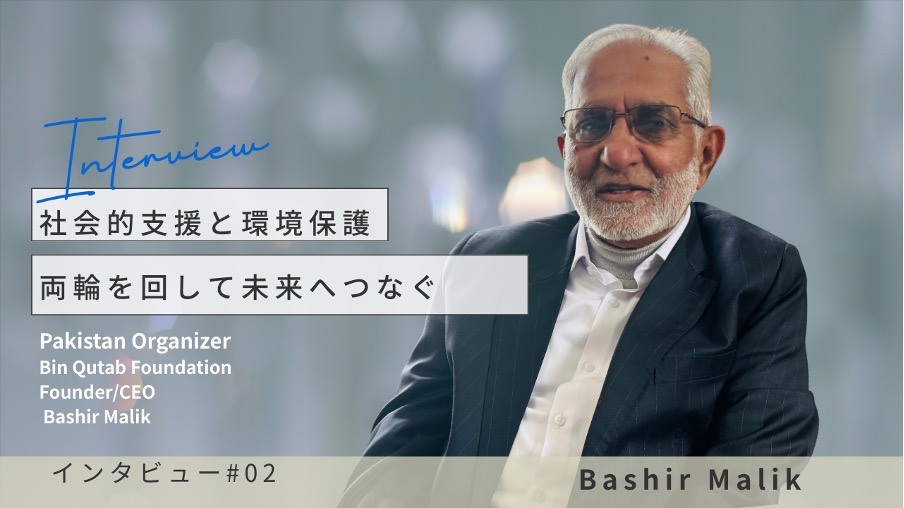
The SPOGOMI World Cup 2025 FINAL is finally approaching next month. Diverse “SPOGOMI athletes” from around the world will gather. The qualifying tournaments that determined each national representative revealed the environmental challenges—especially waste issues—faced by different countries and regions. Through SPOGOMI’s simple action of “picking up litter,” the circle of environmental awareness has been steadily expanding. This time, we interviewed Mr. Bashir Malik, the Founder & Chairman of the BIN QUTAB Foundation, which serves as the tournament organizer in Pakistan. The BIN QUTAB Foundation has long worked on addressing social issues through healthcare, education, and livelihood support. In recent years, it has also focused on environmental issues, and since encountering SPOGOMI, it has been expanding its activities further within the country. Here, we introduce how the BIN QUTAB Foundation is involved with SPOGOMI and how it is tackling Pakistan’s waste problems.
— First, could you tell us about the journey of the BIN QUTAB Foundation?
Our BIN QUTAB Foundation is a non-profit organization established in 2007. We have been providing support in healthcare, education, and basic living infrastructure to people living in rural areas and urban slums of Pakistan. Our first project was to build a hospital in a rural area called Chakwal in Punjab Province. Operating a large medical facility in the rural areas of a developing country is extremely difficult, but the BIN QUTAB Foundation managed to achieve this challenge over more than 15 years.
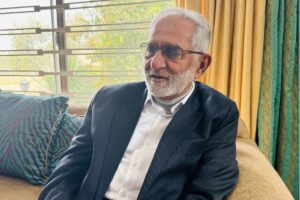
(“We have been providing support in healthcare, education, and basic living infrastructure,” says Mr. Malik, representative of the BIN QUTAB Foundation.)
This hospital providing Free Healthcare facilities to needy patients includes a dialysis unit, operating rooms, ophthalmology and dentistry departments, a pharmacy, a laboratory, and a medical education college, providing healthcare to residents within a 70 km radius. More than one million people have received services from this hospital to date. In addition, to deliver healthcare to residents in mountainous areas, the foundation operates mobile hospitals. They also focus on clean water supply, support for people with disabilities, and early disease diagnosis. In Chakwal district, they have provided 2000 wheelchairs and medical assistance to over 10,000 people with disabilities. Looking ahead, they plan to expand their activities to the Middle East, Europe and the United States, and Southeast Asia.
— So your activities expanded from medical support. How, then, did SPOGOMI first begin in Pakistan?
The waste problem in Pakistan is severe. Rapid population growth has overwhelmed the country’s waste management capacity. In addition, in urban areas, low public awareness of waste separation, combined with illegal dumping and an underdeveloped sorting and processing system, has resulted in garbage being discarded everywhere. This is a major social issue in Pakistan, and in addition to developing systems such as resource recovery, raising public awareness is an essential path toward solutions.
Since childhood, I have considered “cleanliness” a basic principle of life and have made a habit of picking up litter daily. Whenever I saw trash around my home, in parking lots, or in parks, I would pick it up. I believe that this “should be normal,” and my act of picking up litter sends a message—often leading others who see it to pick up trash themselves next time. I think these actions gradually influence those around me, creating a small chain of awareness.
Amid such daily practices, I learned about Japan’s SPOGOMI through a newspaper article introducing its activities in Bangkok. Soon after, I asked my staff to investigate and began exploring the potential of the activity. Gradually, I was moved by the potential for individual actions to grow into an organized movement, and I decided to expand SPOGOMI across Pakistan.
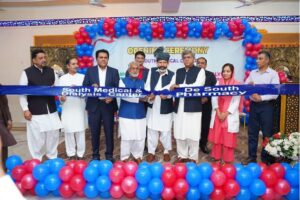
(The BIN QUTAB Foundation has spent over 15 years establishing large-scale medical facilities in rural areas of developing countries.)
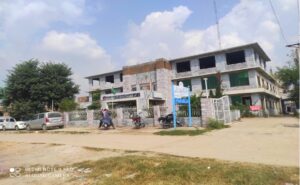
(One of the hospitals operated by the BIN QUTAB Foundation that provides free medical care.)
Now, I can feel that awareness has grown so much that litter-picking activities involving local residents are spreading not only in urban areas but also in rural areas. Based on the framework of SPOGOMI, environmental activities that people can enjoy while participating are steadily spreading.
— So the philosophy of the BIN QUTAB Foundation resonated with SPOGOMI. How would you like to make use of SPOGOMI in the future?
That’s right. We believe that “environmental issues are even more important than food issues.” Because if the environment is destroyed, it becomes difficult to protect health even if food is available. Particularly serious is climate change, which affects not only the present but also future generations, and we believe it is a challenge that governments around the world must address earnestly.
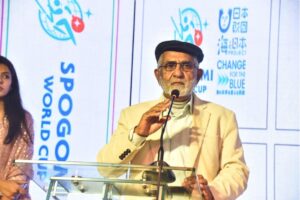
(“Moved by the potential of SPOGOMI, he decided to expand it across Pakistan.”)
Activities like SPOGOMI can transform litter picking from a mere task into a “social movement that people can enjoy participating in.” Through this movement, the BIN QUTAB Foundation hopes that more people will become interested in environmental issues and take action.
— The health impacts caused by pollutants harmful to living beings and the planet are indeed urgent. Finally, could you tell us about the future of SPOGOMI in Pakistan and the Foundation’s next steps?
In addition to the social support it has long focused on—such as healthcare and education—the BIN QUTAB Foundation is also driving the wheel of environmental protection, opening a path that leads to the future. What began as a small action through SPOGOMI is crossing borders, with the strong aim of becoming a step toward a sustainable society.
And this challenge is spreading quietly, yet steadily and surely.